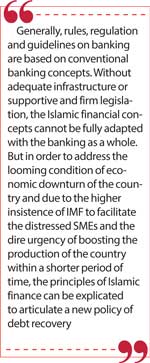Friday Feb 20, 2026
Friday Feb 20, 2026
Friday, 9 August 2024 00:20 - - {{hitsCtrl.values.hits}}

Islamic Finance prevents the hazardous, ambiguous and uncertain transactions
 1. Introduction:
1. Introduction:
Islamic Finance (IF) is based on the Shariah principles which are interpreted via Quran and Sunnah. It is operated currently globally not only in Muslim countries, in other Western and Eastern countries which are based on conventional banking principles. Hence, it is imperative to analyse how the IF can be adopted as a global financial system in order to address most of the current economic hazards in the world.
In Islam, it highly considers that the resources are needed to fulfil the material requirements of both individual and society. The high concern and knowledge on these ethical principles are directed to the personal and societal justice and tranquillity which is the way to the fair financial system. Especially, in the event of handling the distressed customers in the financial institutions, the principles of IF can be successfully adapted.
2. Principles of Islamic Finance
The gap between the rich and the poor is extremely large; this gap has been substantially enlarged pauperising both local and global community due to the pandemic and economic recession. The decline of the business, especially the SMEs has worsened this situation. With the perspective of Inclusive and Socioeconomic Sustainable Development in order to end up the poverty and to cope with inequality and injustice and to tackle the climate change in the globe, the social concern along with the individualism is paramount important in domestic and international finance.
The most important principles of IF which can be implemented in Distressed Debt Recovery Process can be underscored as follows.
2.1 Prohibition of interest (Riba):
In IF, the loans are granted without charging any interest with the purpose to ensure equity and to prevent any exploitation in financial transactions. Any unfair wealth at the cost of someone is prohibited by Islamic Finance. There are two types of Riba, namely Riba al-Fadl which prohibits any excess in sales or barter and Riba al-Nasiah which prohibits any excess in debts.
2.2 Prohibition of speculation (Maysir) and uncertainty (Gharar):
The certainty of the contracts with clear, transparent and fair conditions with consistent of Islamic values and principles, is assured by Islamic Finance. It never recommends the loss of one party at the success of the other party.
2.3 Sharing profit and loss:
This can be defined as a mechanism on wealth redistribution and risk sharing. There may be a profit associated with wealth and there may be a loss generating from an identified risk. In this both case, profit (wealth) and loss (risk) should be shared among the partners.
3. Adaption of the principles of Islamic Finance to the debt recovery process:
 Generally, rules, regulation and guidelines on banking are based on conventional banking concepts. Without adequate infrastructure or supportive and firm legislation, the Islamic financial concepts cannot be fully adapted with the banking as a whole. But in order to address the looming condition of economic downturn of the country and due to the higher insistence of IMF to facilitate the distressed SMEs and the dire urgency of boosting the production of the country within a shorter period of time, the principles of Islamic finance can be explicated to articulate a new policy of debt recovery.
Generally, rules, regulation and guidelines on banking are based on conventional banking concepts. Without adequate infrastructure or supportive and firm legislation, the Islamic financial concepts cannot be fully adapted with the banking as a whole. But in order to address the looming condition of economic downturn of the country and due to the higher insistence of IMF to facilitate the distressed SMEs and the dire urgency of boosting the production of the country within a shorter period of time, the principles of Islamic finance can be explicated to articulate a new policy of debt recovery.
3.1 Interest concessions on restructuring/rescheduling non-performing loans:
In conventional banking, interest for loans can be identified as the compensation of the lender for the risk of lending money. The weight of risk is defined on credit score of the borrower, type of the loan etc., accordingly the rate of the interest would be varied.
The non-performing loans are identified as risk weighted assets by the financial institutions which have been fully or partially provisioned as per the SLFRS 9 inclusive of both capital and existing interest together with the interest to be accrued in future. If there is any recovery of interest from a non performing liability, it will be fully credited to the bank profit at the very first instance due to the unpaid interest has been already provisioned.
The major request of the distressed customer is to providing a relief to the burgeoning interest of the loan facility at a higher rate. Generally, when the banks are re-structuring the non-performing loans, the existing capital is restructured at a concessionary rate of interest in addition to the existing interest for the loan facility. This process directs the banks to generate the double profit from the debt restructuring of distressed loans.
It is justified to have this type of mechanism under the conventional banking sphere, since it is mainly focused the profit. However, in the perspective of distressed customer, he should be eligible for demanding more concessions on interest. Not for the all cases, but for the selected cases with considering the socio economic impact, it is prudent to allow the non- performing customers to repay their loans without charging an additional interest for existing capital and interest of the loans. This is not fully complied with Islamic Financial concepts, but partially aligned. It is imperative to identify the core intention of the principle of ban on Riba, which is to prevent any unfair wealth.
3.2 Prevention of uncertainty and speculation:
The Islamic Finance prevents the hazardous, ambiguous and uncertain transactions. The parties should be honest and reveal all the information with regarding the financial status, real capabilities and incapabilities of the business, avoiding any information asymmetry and moral hazard situation, at the event of re-structuring the non- performing debts.
The relationship with the customer should be relocated with new dimensions at the re-structuring moment with strong understanding between the parties. Having a compromising settlement for the repayment of the non-performing loan facilities is a long and continuous process with series of negotiations up to a win-win destination for both parties.
The debt recovery process should not be ended up with re-structuring/re-scheduling, the bank should associate with the customer’s business in order to intensify the generation of the cash flow of the distressed business. The bank should understand that the profit of the customer’s business is the profit of the bank. Hence, the customer should be treated as a shareholder of the bank; the bank should be treated as the partner of the business. With the mutual understanding and incorporation of both parties, there is nothing to be undisclosed and a firm trust can be established with the customer, which enforces him to do the repayments in regular manner.
3.3 Risk sharing and wealth redistribution:
Islamic finance pursues risk sharing intermediation in order to establish the shared prosperity and financial inclusion. Risk sharing and wealth distribution are well interconnected, in consequent to the wealth distribution, risk is proportionately shared among the parties according to the risk they bear, and then the entrepreneurial spirit in the society would be invigorated.
Being the partner of the business, the bank should bear the loss as well as can enjoy the profit of the business. After re-structuring the non-performing loans, if the business is operated in a sustainable manner, the bank can recover the differed interest which has been waived off at the event of restructuring from the current profit of the business aligning with the concept of wealth redistribution. Under the Wealth Management Cycle of Islamic finance, it can be described that the wealth redistribution has been taken as a tool to share the risk and to balance the wealth created within the economy.
Unlike the conventional banking, the Islamic banking prohibits the fund mobilisation and establishes the financial inclusion via risk sharing and redistribution of the gains. Hence, these concepts can be effectively adapted to articulate a successful policy on restructuring of distressed loans in the financial institutions.
4. Conclusion:
Nowadays, several attempts have been initiated by CBSL and the Government in order to address the financial mayhem of the country targeting the economic oscillation. Sri Lanka has very limited period of time up to 2028 being the concessionary period which has been granted by the international creditors, for boosting and generating the income from the local businesses. Therefore, simultaneously the local businesses should have a concessionary period for the repayment of their loan facilities while revamping their business up to a sustainable position.
It is the responsibility of all the financial institutions to rehabilitate the distressed businesses with various tools and techniques like restructuring and rescheduling without initiating detrimental and brutal litigation processes and without targeting the extraordinary profit. In order to establish a successful debt restructuring mechanism with the purpose of rehabilitating the customer and to boosting the national economy, the above inscribed concepts of Islamic Finance can be amazingly adapted.
(The writer is a banker and an Attorney at Law.)